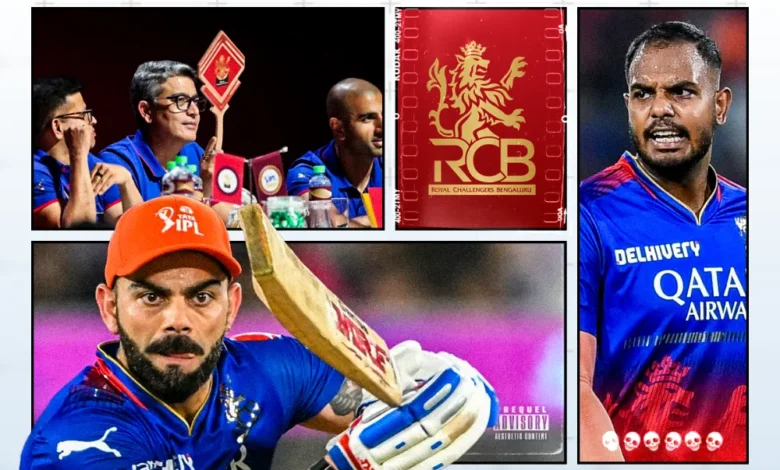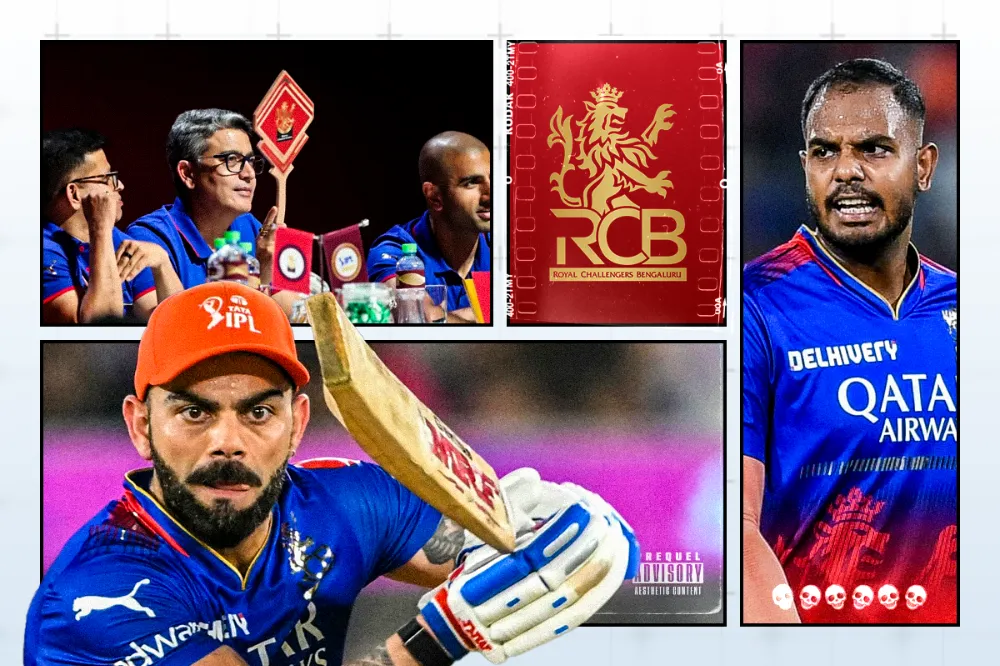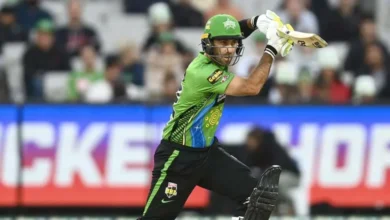

Royal Challengers Bangalore (RCB) faced a mixed IPL 2024 season, struggling with inconsistencies in both batting and bowling. Despite star players Virat Kohli and Faf du Plessis, their opening partnerships often failed to deliver, with just four partnerships over 50 in 14 games. Their powerplay batting average ranked 4th among teams, indicating a lack of synergy between the openers. RCB’s bowling was also disappointing, with poor powerplay and middle-overs performances. Their average in the powerplay was one of the worst in the competition, while their death overs bowling saw minor improvement but still suffered from high economy rates. However, RCB excelled in the middle and death overs with strong contributions from Rajat Patidar, Will Jacks, and Dinesh Karthik, who were key in building competitive totals. The team’s home ground, M. Chinnaswamy Stadium, provided some solace, where RCB won 4 out of 7 matches and made it to the playoffs. For IPL 2025, RCB needs to bolster their squad with a destructive top-order batter, a reliable finisher, a quality spinner, and a wicketkeeper-batter. Targeting players like Jos Buttler, Yuzvendra Chahal, and KL Rahul could strengthen their chances.
Royal Challengers Bengaluru’s batting performance in IPL 2024 was a mixed bag, with notable highs but glaring weaknesses that hampered their progress. One of their biggest challenges was their inconsistent opening stand. Despite boasting a star-studded duo of Virat Kohli and Faf du Plessis, the pair managed partnerships exceeding 50 runs in only four of their 14 games. Their powerplay average of 56 runs ranked fourth among all teams, a disappointing statistic given the calibre of their top order. This highlights a lack of compatibility between Kohli and Faf as an opening combination. RCB’s bowling in IPL 2024 was a significant weak point, with struggles across all phases of the game. In the powerplay, RCB’s bowling average was 58.60, ranking them as the fourth-worst team in this category. Their bowling strike rate was 22.5, with an economy rate of 9.77, which was also among the worst in the competition
Middle overs
On the brighter side, RCB excelled in the middle overs, registering a league-high batting average of 101.6. This success was largely driven by Rajat Patidar, who delivered 395 runs at an impressive strike rate of 177.13, his career-best in the IPL. Particularly lethal against spin, Patidar struck at 197.24, making him a key weapon in RCB’s arsenal. Will Jacks complemented Patidar well, contributing 230 runs at an average of 32.86 and an equally remarkable strike rate of 175.57. Together, they ensured RCB consistently capitalized on the middle overs to build competitive totals. This poor performance carried over into the middle overs, where RCB’s bowling average soared to 107, coupled with a strike rate of 19.35 and an economy of 9.81.
Death overs
RCB’s batting also shone in the death overs, where they topped the charts with a batting average of 54.57. Dinesh Karthik played a pivotal role here, scoring 326 runs at an average of 36.22 and a blistering strike rate of 187.36, cementing his reputation as a death-over specialist. The death overs fared slightly better but still left much to be desired, with an average of 65.85, a strike rate of 14.96, and an economy rate of 10.93.
However, RCB’s batting lineup had its share of setbacks. Glenn Maxwell endured a dismal season, managing just 52 runs in nine games. At 36, his struggles against spin and pace variations were evident, raising questions about his value, especially with an ₹11 crore price tag. Cameron Green also underwhelmed, averaging 31.88 at a strike rate of 143.26 without any half-centuries. Additionally, a weak lower-middle order failed to support Karthik, with players like Suyash Prabhudessai and Mahipal Lomror unable to convert starts into impactful contributions.
A key issue for RCB was their investment in Alzarri Joseph, who was bought for ₹11.5 crores but failed to make an impact. He played just three matches, taking a single wicket with a dismal average of 115 and an economy rate of 11.90. This acquisition proved to be a costly mistake. Akash Deep was another weak link, with an IPL bowling average of 45.57 and an economy rate of 11.67, making him an unreliable option in the attack. Even Mohammed Siraj, usually a mainstay in RCB’s bowling lineup, had a tough start, with a bowling average of 57.25 in his first seven games. Cameron Green, too struggled to make an impression with the ball, failing to adapt to the Indian conditions, as evidenced by his IPL bowling average of over 40. Glenn Maxwell’s bowling value also diminished with the introduction of the impact player rule, leaving RCB with limited options in their bowling attack. These bowling inefficiencies ultimately contributed to RCB’s inability to create pressure and defend totals, severely hampering their chances of success in the tournament.
A bright spot in RCB’s bowling was the resurgence of Yash Dayal. The versatile bowler claimed 15 wickets, averaging 30.60 with an economy rate of 9.15. His powerplay performance was particularly impressive, with an economy of 8.97, outperforming marquee bowlers like Mitchell Starc, Pat Cummins, and Mohammed Siraj. Dayal’s consistency and effectiveness in the early overs were key positives for RCB in an otherwise underwhelming bowling lineup.
What Chinnaswamy offered for RCB?
Despite their shortcomings, RCB found strength in their passionate fan base in Bengaluru, with the M. Chinnaswamy Stadium serving as their fortress. The team had a mixed record at home in IPL 2024, winning 4 out of 7 matches. Playing in front of their home crowd, RCB managed to qualify for the playoffs, finishing 4th overall. Virat Kohli led the charge with the bat, amassing 340 runs at an impressive average of 56.67. Yash Dayal stood out with the ball, claiming 10 wickets at an economy of 8.36. While the season had its ups and downs, RCB’s strong home performance provided their fans plenty to celebrate.
What RCB have and what they need?
After spending a hefty ₹37 crore to retain three key Indian players from their 2024 squad, Royal Challengers Bangalore (RCB) are set to rebuild once again in the IPL 2025 mega auction. The retained players—Virat Kohli, Yash Dayal, and Rajat Patidar—will form the core of RCB’s strategy as they look to strengthen their team and make a fresh bid for the title.
To strengthen their squad, RCB must focus on key areas: a destructive top-order batter, a reliable finisher, a wicketkeeper-batter, and a quality spinner. For the top order, they could target Jos Buttler, who has scored 3055 runs in 83 IPL matches, or Jake Fraser-McGurk, whose strike rate of 234.04 in IPL 2024 was impressive. As a finisher, Ashutosh Sharma (strike rate 167.26) and David Miller (average 32.5, strike rate 136.5) are strong options. On the bowling front, RCB urgently needs a spinner, with Yuzvendra Chahal being a top choice. Despite his excellent record at RCB, Chahal was released before the 2022 auction, but has since continued his good form with Rajasthan Royals, taking 66 wickets in three seasons. Additionally, RCB should pursue KL Rahul, who could provide both wicketkeeping and batting stability, along with leadership experience. With 4683 runs in 132 IPL matches, he’d be a valuable addition.
After discussing potential buys, let’s turn to who RCB might target with their RTM (Right to Match) card.
Mohammed SirajSiraj has been part of RCB since 2018 and was among the players released ahead of the previous mega auction. In IPL 2024, he picked up 15 wickets in 14 matches but struggled with an economy rate of 9.19. Renowned for his ability to strike with the new ball, his recent progress in death bowling adds to his value. RCB could consider using the RTM card to retain this versatile pacer.
Will JacksWill Jacks proved to be a game-changer for RCB during IPL 2024. The 25-year-old England all-rounder made an immediate impact, stepping in for Glenn Maxwell. Scoring 230 runs at an incredible strike rate of 175.57 across 8 matches, he also smashed a stunning 41-ball century against Gujarat Titans. His explosive batting could make him a prime candidate for the RTM card.
Anuj RawatAnuj Rawat has shown consistent growth since his IPL debut with Rajasthan Royals in 2021, joining RCB in 2022. Thriving under the Impact Player rule in 2023, he was retained for 2024. Across 24 matches, Rawat has accumulated 318 runs with an average of 19.88 and a strike rate of 119.10. His top score of 66, along with 26 fours and 14 sixes, underscores his potential as a reliable hitter.
Get updates! Follow us on
#Analyzing #Royal #Challengers #Bengalurus #Strategy

